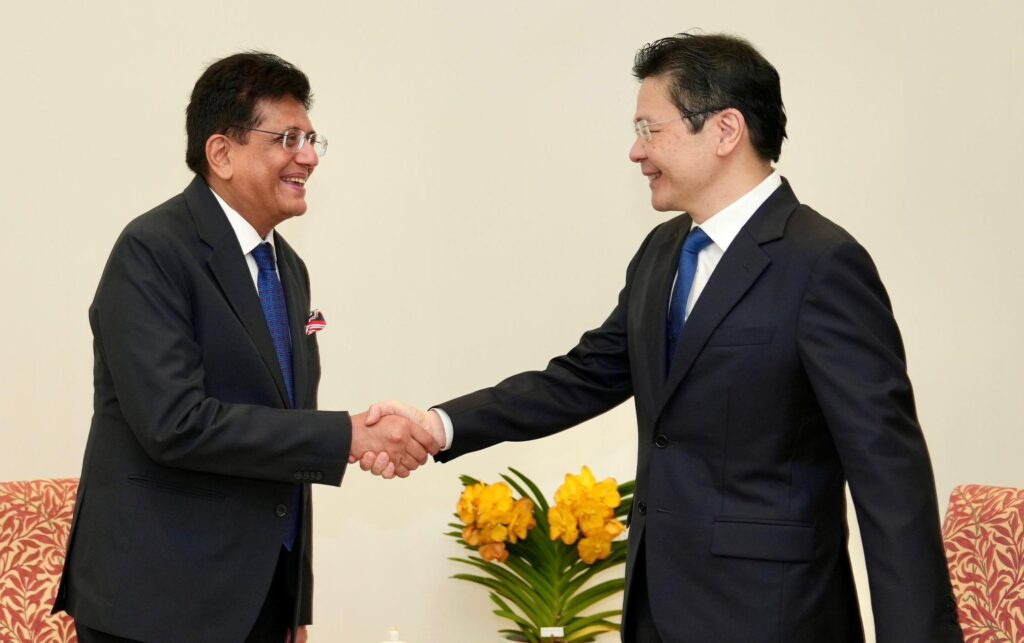
Indian Minister of Commerce and Industry Piyush Goyal has visited Singapore as his first stop in a three-nation tour, during which he is looking to further drive Indian exports into newer territories and put the spotlight on India’s trade pact with the European Free Trade Association (EFTA).
The minister’s overseas visit also includes Qatar and ends with the G20 trade ministers’ meet in South Africa. There, he will have a discussion with European Union (EU) Trade Commissioner Maroš Šefčovič.
Goyal’s tour is timed with the coming into force of the India-EFTA trade pact on October 1, 2025. The European Free Trade Association has four member states: Iceland, Norway, Liechtenstein, and Switzerland. This is a regional bloc aimed at promoting ease of trade between its members.
India is in separate negotiations for a comprehensive free trade agreement (FTA) with the European Union, which is a 27-nation bloc. This FTA is expected to be finalised by the end of 2025.
While in Singapore, the Indian minister met Prime Minister and Finance Minister Lawrence Wong and key figures in the island nation’s economy. Posting on X, Goyal wrote this morning: “Delighted to call on H.E. @LawrenceWongST, Prime Minister of Singapore. Discussions reaffirmed our commitment to further strengthen our comprehensive strategic partnership, building on the strong momentum and vast potential for future growth.”
During the Singapore leg of his overseas trip, Goyal also met Chin Yau Seng, CEO of the Singapore Airlines Engineering Company (SIAEC), a subsidiary of the Singapore International Airlines Group.
Economic topics discussed at this meeting included collaboration in innovation, skill development, and investment “to boost India’s growing aerospace ecosystem and enhance global connectivity”.
USD 100 billion partnership with EFTA
Ever essential for any country’s sustained economic growth, exports to newer territories and trade tie-up with more and more nations has become crucial for India, following the unleashing of a tariff war by US President Donald Trump.
As a buyer of Russian crude oil, India has been blamed by the United States of America for allegedly fuelling the Russia-Ukraine war and, therefore, Indian exports have been hit with some of the heftiest tariffs in the world. That makes export diversification an immediate necessity.
A PTI report said that under its trade pact with the four-nation EFTA bloc, India has received an investment commitment of USD 100 billion over 15 years, while lowering or removing duties on products like Swiss watches and chocolates.
Terming the start of the trade pact “a historic day”, Goyal said on Wednesday that it would unlock new opportunities for trade, investment and job creation, benefiting people and businesses.
“Truly a historic day, as the India-EFTA Trade and Economic Partnership Agreement (TEPA) comes into force,” he said in a post on X.
Together, India and the EFTA states represent a combined GDP of about USD 5.4 trillion, providing the scale for deeper integration, said the PTI report.
“The entry into force of the TEPA is a concrete step towards deepening the relationships between the EFTA states and India, building bridges and encouraging trade and investment,” said a joint communiqué.
It provides enhanced market access and streamlines customs procedures, making it easier for Indian and EFTA businesses to expand their operations into growing markets, it added.
Domestic customers will get access to high-quality Swiss products, such as watches, chocolates, biscuits, and clocks, at lower prices, as India will phase out customs duties under the trade pact on these goods over 10 years.
The EFTA bloc has committed an investment of USD 100 billion — USD 50 billion within 10 years after the implementation of the agreement and another USD 50 billion in the next five years — which would facilitate the creation of one million direct jobs in India.


